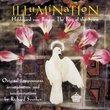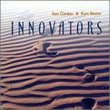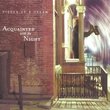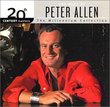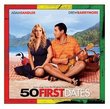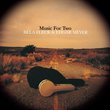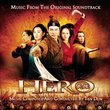| All Artists: Trio Mediaeval, Leonel Power, Gavin Bryars, Ivan Moody, Gregorian Chant Title: Trio Mediaeval: Soir, Dit-Elle Members Wishing: 2 Total Copies: 0 Label: ECM Records Release Date: 1/27/2004 Genres: Special Interest, Pop, Classical Styles: Vocal Pop, Opera & Classical Vocal, Chamber Music, Historical Periods, Classical (c.1770-1830), Early Music Number of Discs: 1 SwapaCD Credits: 1 UPCs: 028947612414, 002894761241 |
Search - Trio Mediaeval, Leonel Power, Gavin Bryars :: Trio Mediaeval: Soir, Dit-Elle
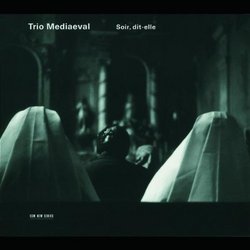 | Trio Mediaeval, Leonel Power, Gavin Bryars Trio Mediaeval: Soir, Dit-Elle Genres: Special Interest, Pop, Classical
The Trio Mediaeval's first CD, Words of the Angel, was an ear-opener, a CD of mostly old music interspersed with some modern works, all ravishingly sung, and, oddly, very harmonious over its span of centuries. This CD feat... more » |
Larger Image |
CD DetailsSynopsis
Amazon.com The Trio Mediaeval's first CD, Words of the Angel, was an ear-opener, a CD of mostly old music interspersed with some modern works, all ravishingly sung, and, oddly, very harmonious over its span of centuries. This CD features most of a mass by the 15th-century Englishman Leonel Power, with works by the Ukrainian Oleh Harkavyy (b. 1968) and the British Ivan Moody (b. 1964), Gavin Bryars (b.1943), and Andrew Smith (b. 1970); there is more new music than old. The Harkavyy Kyrie sounds "older" than all of the Power, which is oddly dense and surprising in its harmonies. A Bryars "Ave Regina" and "Laude Novella" (this last for solo voice) wafts in and out of oldness and modernity in novel but not uncomfortable ways, and Andrew Smith offers an "Ave Maria" and "Regina Caeli" which are distinctly modern but simply beautiful--and wonderfully pious. The two works by Ivan Moody, while not as staggeringly beautiful and daring as his contributions to the Trio's premiere CD, are almost as beautiful, growing in loveliness with each hearing. A Gregorian Chant ends this CD of devotional music. The whole is dizzyingly beautiful and endlessly interesting; the sonics are as gloriously clear and clean as the Trio's pitch, taste, and inherent sound. Don't do without this CD. --Robert Levine Similarly Requested CDs
|
CD ReviewsColdly beautiful J. TIMMERMAN | Lawson, NSW Australia | 06/03/2004 (4 out of 5 stars) "Trio Mediaeval, a three-women European a cappella choir, presents here a minimalist programme of medieval three-part harmony mixed with 20th century pieces in the same style.Leonel Power's (1370-1445) Missa "Alma redemptoris mater" is presented in its entirety but broken up with pieces by English composers Ivan Moody, Gavin Bryars and Andrew Smith, and Ukrainian Oleh Harkavyy. Power stood alongside John Dunstable as one of the great English composers of the 14th-15th centuries. This mass is probably one of the earliest to use the same "cantus firmus" in all four movements. The chant is repeated by the low voice throughout while the two upper voices create an intricate counterpoint.The contemporary composers here draw their inspiration from ancient texts and chants to make their own individual polyphony, but sharing the same austere atmosphere as Power's mass.Trio Mediaeval follows in the footsteps of Anonymous 4 in bringing the beauty of Medieval a cappella vocal music to the public. Tonally Trio Mediaeval is very similar to Anonymous 4 but doesn't quite match that group's precision of vocal delivery. Nevertheless, a nicely recorded album with a touch of cold beauty." Perfection to little effect Fabiano Seixas Fernandes | Florian�polis, SC Brazil | 03/07/2005 (4 out of 5 stars) "For those familiar with Trio Mediaeval's first record, WORDS OF THE ANGEL, it is impossible not to compare the two. I'm not talking about natural expectations, but of the fact that SOIR, DIT-ELLE seems to have been structured after WORDS. Unlike WORDS, however, SOIR dwells greatly on modern repertoire. All contemporary pieces in SOIR seem to have been composed with skill and interpreted to perfection; still, it does not seem to me to be as engaging as WORDS. It wants variety; differences between 13th-century "Missa Alma redemptoris mater" and contemporary pieces are blurred by the homogeneity of mood of the latter: all want to be contemporary rework on medieval vocal music; all want to be slow, melodious and dissonant; all were composed having Trio Mediaeval as ideal performers; as a result, all resemble one another too much. When it comes to the solo pieces, for example, they seem more elaborated than the versions which served them as a starting point (available in WORDS), but it was precisely the original simplicity which made them so touching. Even though Ivan Moody's pieces aren't as striking as "Words of the angel" (the impact of which is partly due to contrast between its "contemporariness" and the "medievalness" of the rest of WORDS' repertoire, by the way), they are still the most moving. SOIR, DIT-ELLE is perfect, but still. Perfection may win you over in the end, but might not do much for you in the beginning. It is possible that those who don't know WORDS OF THE ANGEL should have a different take on it, and like it better." Fascinating and captivating Stanley D. Wolfersberger | Ohio | 07/30/2005 (5 out of 5 stars) "I'm a huge fan of early music, but my taste tends to lead me down the road of the French cantata more than anything. I stumbled across this particular album at a local Border's and decided to give it a chance, knowing nothing about it.
I think it's simply fantastic. The vocals are pure and captivating, and the literature choice is first-rate; the combination of "true" early music, coupled with modern interpretation presents an excellent balance." |

 Track Listings (14) - Disc #1
Track Listings (14) - Disc #1

